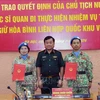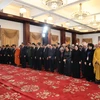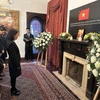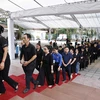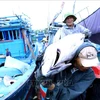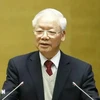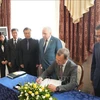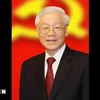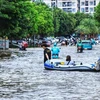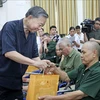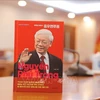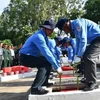The fourth international seminar on the East Sea wrapped up in Ho Chi Minh City on November 21 after three days of sitting.
The event, themed “East Sea: Cooperation for Regional Security and Development” drew 200 delegates, including 100 international representatives from 27 countries and territories.
President of the Diplomacy Academy of Vietnam, Dang Dinh Quy, said the seminar was of scholarly quality with frank and constructive discussions.
Delegates at the event analysed and exchanged views on the causes of tension in the East Sea , assessed factors that influence the making and implementation of East Sea policies in some countries, and further analysed the interests and roles of parties directly and indirectly concerned in the dispute.
According to Quy, recommendations made at the seminar focused on promoting trust building measures, clarifying claims in accordance with international law - especially the 1982 UN Convention on the Law of the Sea - and enhancing the formation of regional cooperation mechanisms and frameworks, in particular the Code of Conduct of Parties in the East Sea.
They also asked concerned parties to employ self control and abide by committed agreements, especially commitments to avoid the use of force and threat to use force, but to deal with disputes through peaceful means, respecting the UN Charter, the Treaty of Amity and Cooperation and the Declaration on the Conduct of Parties in the East Sea , of which the concerned partiers are members.
At the seminar, participating scholars agreed that the East Sea is increasingly of interest to countries in and outside the region in a time when the world’s economic and political focus is shifting towards Asia-Pacific, particularly when big countries, including the US, China and other regional countries consider sea territory as the most important security and development space in the 21st century.
Some scholars warned that the greatest challenges to ASEAN in the coming years are the conflicting interests of ASEAN member states. If ASEAN cannot remain united, the association’s role in regional cooperation mechanisms will diminish and its members’ benefits will be ignored.
They raised historical facts that prove the use of force or the threat of using force do not solve such disputes as those in the East Sea, and peaceful solutions are the only means. Enhancing ASEAN’s role is seen as an element to promote dialogue and cooperation.
Scholars proposed that concerned countries restudy their perceptions of their basic national interests in the East Sea . They suggested raising the benefits from economic development and social stability, peace and regional development above the benefits that can be reaped from expanding sovereignty and sovereignty right in the sea.
While seeking a long term solution, it is vital to manage disagreements to prevent them escalating into conflicts and crises, they said, calling for the prompt development of regional mechanisms, like the Code of Conduct in the East Sea , to orientate the conduct of related parties in specific circumstances.
The concerned parties need to clarify their claims in the East Sea based on international law and make their policies and national strategies in the East Sea , especially the policy on military modernisation, transparent to solidify confidence in the region, the scholars said.
Regarding the legal aspect, they underscored the importance of the 1982 UN Convention on the Law of the Sea, recognising, respect to the exclusive economic zone and continental shelf of coastal nations.
Many of the scholars emphasised that China’s “historic right” and “cow-tongue line” are groundless and ignite concerns for related nations.
To make the control of disputes and settlement of disputes in the East Sea easy, the scholars proposed that disputing parties cooperate in surveying natural and geographical conditions of entities in the East Sea so as to define legal mechanisms of these entities in compliance with the 1982 UN Convention on the Law of the Sea. From that, the disputing parties can make clear their claims on sovereignty and waters in the East Sea.-VNA
The event, themed “East Sea: Cooperation for Regional Security and Development” drew 200 delegates, including 100 international representatives from 27 countries and territories.
President of the Diplomacy Academy of Vietnam, Dang Dinh Quy, said the seminar was of scholarly quality with frank and constructive discussions.
Delegates at the event analysed and exchanged views on the causes of tension in the East Sea , assessed factors that influence the making and implementation of East Sea policies in some countries, and further analysed the interests and roles of parties directly and indirectly concerned in the dispute.
According to Quy, recommendations made at the seminar focused on promoting trust building measures, clarifying claims in accordance with international law - especially the 1982 UN Convention on the Law of the Sea - and enhancing the formation of regional cooperation mechanisms and frameworks, in particular the Code of Conduct of Parties in the East Sea.
They also asked concerned parties to employ self control and abide by committed agreements, especially commitments to avoid the use of force and threat to use force, but to deal with disputes through peaceful means, respecting the UN Charter, the Treaty of Amity and Cooperation and the Declaration on the Conduct of Parties in the East Sea , of which the concerned partiers are members.
At the seminar, participating scholars agreed that the East Sea is increasingly of interest to countries in and outside the region in a time when the world’s economic and political focus is shifting towards Asia-Pacific, particularly when big countries, including the US, China and other regional countries consider sea territory as the most important security and development space in the 21st century.
Some scholars warned that the greatest challenges to ASEAN in the coming years are the conflicting interests of ASEAN member states. If ASEAN cannot remain united, the association’s role in regional cooperation mechanisms will diminish and its members’ benefits will be ignored.
They raised historical facts that prove the use of force or the threat of using force do not solve such disputes as those in the East Sea, and peaceful solutions are the only means. Enhancing ASEAN’s role is seen as an element to promote dialogue and cooperation.
Scholars proposed that concerned countries restudy their perceptions of their basic national interests in the East Sea . They suggested raising the benefits from economic development and social stability, peace and regional development above the benefits that can be reaped from expanding sovereignty and sovereignty right in the sea.
While seeking a long term solution, it is vital to manage disagreements to prevent them escalating into conflicts and crises, they said, calling for the prompt development of regional mechanisms, like the Code of Conduct in the East Sea , to orientate the conduct of related parties in specific circumstances.
The concerned parties need to clarify their claims in the East Sea based on international law and make their policies and national strategies in the East Sea , especially the policy on military modernisation, transparent to solidify confidence in the region, the scholars said.
Regarding the legal aspect, they underscored the importance of the 1982 UN Convention on the Law of the Sea, recognising, respect to the exclusive economic zone and continental shelf of coastal nations.
Many of the scholars emphasised that China’s “historic right” and “cow-tongue line” are groundless and ignite concerns for related nations.
To make the control of disputes and settlement of disputes in the East Sea easy, the scholars proposed that disputing parties cooperate in surveying natural and geographical conditions of entities in the East Sea so as to define legal mechanisms of these entities in compliance with the 1982 UN Convention on the Law of the Sea. From that, the disputing parties can make clear their claims on sovereignty and waters in the East Sea.-VNA

